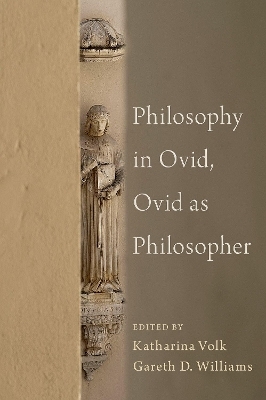
Philosophy in Ovid, Ovid as Philosopher
Oxford University Press Inc (Verlag)
978-0-19-761033-6 (ISBN)
Ovid has long been celebrated for the versatility of his poetic imagination, the diversity of his generic experimentation throughout his long career, and his intimate engagement with the Greco-Roman literary tradition that precedes him; but what of his engagement with the philosophical tradition? Ovid's close familiarity with philosophical ideas and with specific philosophical texts has long been recognized, perhaps most prominently in the Pythagorean, Platonic, Empedoclean, and Lucretian shades that have been seen to color his Metamorphoses. This philosophical component has often been perceived as a feature implicated in, and subordinate to, Ovid's larger literary agenda, both pre- and post-exilic; and because of the controlling influence conceded to that literary impulse, readings of the philosophical dimension have often focused on the perceived distortion, ironizing, or parodying of the philosophical sources and ideas on which Ovid draws, as if his literary orientation inevitably compromises or qualifies a "serious" philosophical commitment.
Philosophy in Ovid, Ovid as Philosopher counters this tendency by considering Ovid's seriousness of engagement with, and his possible critique of, the philosophical writings that inform his works. The book also questions the feasibility of separating out the categories of the "philosophical" and the "literary" in the first place, and explores the ways in which Ovid may offer unusual, controversial, or provocative reactions to received philosophical ideas. Finally, it investigates the case to be made for viewing the Ovidian corpus not just as a body of writings that are often philosophically inflected, but also as texts that may themselves be read as philosophically adventurous and experimental.
The essays collected in this volume are intended at the individual level to address in new ways many aspects of Ovid's recourse to philosophy across his corpus. Collectively, however, they are also designed to redress what, in general terms, remains a significant lacuna in Ovidian studies.
Katharina Volk is Professor of Classics at Columbia University and the author of numerous books, including The Poetics of Latin Didactic, Manilius and his Intellectual Background, and The Roman Republic of Letters. Gareth D. Williams is Professor of Classics at Columbia University. His previous books include The Cosmic Viewpoint and Pietro Bembo on Etna. Together, Volk and Williams edited the collection Roman Reflections.
Preface
Contributors
Introduction
Katharina Volk and Gareth D. Williams
Part I: Ovid's sapientia
1. Ouidius sapiens: The Wise Man in Ovid's Work
Francesca Romana Berno
Part II: The Erotic Corpus
2. Elegy, Tragedy, and the Choice of Ovid (Amores 3.1)
Laurel Fulkerson
3. Ovid's Ars amatoria and the Epicurean Hedonic Calculus
Roy Gibson
4. Criticizing Love's Critic: Epicurean parrhesia as an Instructional Mode in Ovidian Love Elegy
Erin M. Hanses
5. Ovid's imago mundi muliebris and the Makeup of the World in Ars amatoria 3.101-290
Del A. Maticic
6. Ovid's Art of Life
Katharina Volk
Part III: Metamorphoses
7. Keep Up the Good Work: (Don't) Do it like Ovid (Sen. QNat. 3.27-30)
Myrto Garani
8. Venus discors: The Empedocleo-Lucretian Background of Venus and Calliope's Song in Metamorphoses 5
Charles Ham
9. Labor and pestis in Ovid's Metamorphoses
Alison Keith
10. Cosmic Artistry in Ovid and Plato
Peter Kelly
11. Some Say the World Will End in Fire: Philosophizing the Memnonides in Ovid's Metamorphoses
Darcy A. Krasne
Part IV: The Exilic Corpus
12. Ovid against the Elements: Natural Philosophy, Paradoxography, and Ethnography in the
Exile Poetry
K. Sara Myers
13. Akrasia and Agency in Ovid's Tristia
Donncha O'Rourke
14. Intimations of Mortality: Ovid and the End(s) of the World
Alessandro Schiesaro
15. The End(s) of Reason in Tomis: Philosophical Traces, Erasures, and Error in Ovid's Exilic
Poetry
Gareth D. Williams
Part V: After Ovid
16. Philosophizing and Theologizing Reincarnations of Ovid: Lucan to Alexander Pope
Philip Hardie
Works Cited
Passages Cited
Index
| Erscheinungsdatum | 13.12.2021 |
|---|---|
| Verlagsort | New York |
| Sprache | englisch |
| Maße | 168 x 246 mm |
| Gewicht | 703 g |
| Themenwelt | Literatur ► Klassiker / Moderne Klassiker |
| Geisteswissenschaften ► Philosophie ► Allgemeines / Lexika | |
| Geisteswissenschaften ► Philosophie ► Philosophie Altertum / Antike | |
| ISBN-10 | 0-19-761033-1 / 0197610331 |
| ISBN-13 | 978-0-19-761033-6 / 9780197610336 |
| Zustand | Neuware |
| Haben Sie eine Frage zum Produkt? |
aus dem Bereich


